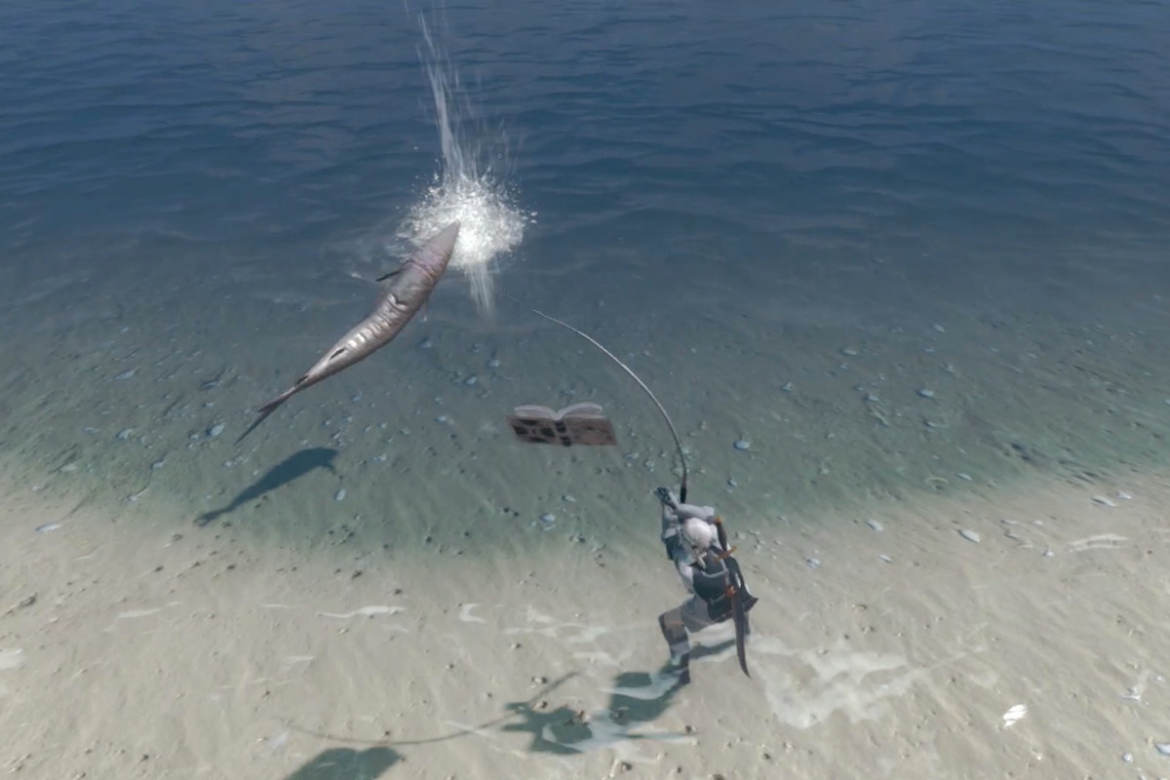Welcome back readers.
The first thing I want to talk about this week is that Critical Distance is hosting another writing/video essay jam! This time, we’re welcoming submissions in any medium with the theme of First Foot Forward: player agency as explored through the first choice a player makes in a game. Check out the post for more details; this jam will run through the month of February.
This Week in Videogame Blogging is a roundup highlighting the most important critical writing on games from the past seven days.
Atrophy Hunter
This week we’re starting with a few broad-perspective pieces dealing with the games industry, its relationships with other artistic media, and culture writing in general.
- Immortality Is An Unfortunate Love Letter to Cinema | cohost
Jeremy Signor doesn’t find much to hold onto beyond Immortality‘s artistic goals of homage. - AND THEN THE SEAGULLS FOUND ME | DEEP HELL
Skeleton muses on the depreciated state of games press from a barstool in a dilapidated MMO. - The Protocol | Bullet Points Monthly
Ed Smith concludes that The Callisto Protocol is Fine but that the textbook upon which it built, our grammar for videogame design, is not.
“The Callisto Protocol is good at all the constituent, component game stuff, and that’s all it is, and that becomes proof that those constituent, component game parts—in isolation of any other ideas or identity—are empty, that mechanics as we’ve come to accept them in most games are, on their own, empty, meaningless, automated, and I’m stuck wondering if it’ll always have to be like that.”
Luminous Insights
We’ve now got a couple of segments specific to new releases. First up is Forspoken, with a focus on its worldbuilding and dialogue.
- Forspoken’s story and dialogue have no chill | Polygon
Ana Diaz situates Forspoken’s dialogue problems in the context of a larger tone issue. - Post-Cringe: Forspoken and the Self-Sabotage of the Smirking Protagonist | Clockwork Worlds
Austin Walker wonders if we wince at Forspoken‘s one-liners because the writers are wincing at their worldbuilding.
“All of which is to say that for me, it’s not so much that “the writing is cringe.” It’s that Frey herself is cringing, and by proxy there is a sense that the writers are doing the same.”
Cutting Critiques
Now we turn our attention to the remake of Dead Space, with a pair of perspectives on the background elements of its story setting.
- Dead Space’s remake improves its main cast, but not the Ishimura’s crew | Polygon
Cass Marshall identifies environmental storytelling as one aspect of Dead Space that might have benefited from a glow-up. - It Eats Entire Planets – Capitalism in Dead Space
Samantha Greer gets to the heart of the true horror of Dead Space.
“As in the real world, the crew are simply meat to their distant employers, a sacrifice for their delusional dreams. The Ishimura, is the grinder.”
Context Sensitive
Let’s move now from worldbuilding to text-to-world perspectives with a series of pieces on animals, policing, and prisons.
- Game: Animals, Video Games, and Humanity (Book Review) | Gamers with Glasses
Alenda Y. Chang considers an out-of-the-box critical approach to animals and the games they sometimes appear in. - Coffee Talk Brews Up Coziness with a Splash of Discomfort | Sidequest
Madison Butler contemplates the dissonance of Coffee Talk‘s uneven fantasy race allegories and its uncritical approach to police power. - Imprisoned Fantasy | Imprisoned Fantasy
Yussef Cole concludes that The Callisto Protocol‘s sci-fi prison setting offers no critical reflection on the contemporary carceral state.
“To sit down today—in a society which has largely ignored the darkness at its iron-barred core—to an experience like Callisto, a game in which a virus rips through a prison, turning inmates into vicious monsters to be put down, is unsettling to say the least. The game appears hardly aware at all of its connection to the real catastrophic events of our own world. It is utterly ignorant, disconnected from reality in a way that only videogames seem capable of being.”
Stories and Tellings
Next up is a wide-ranging section bringing together perspectives on mythology, legacies, and artifacts.
- power(less) fantasy | a weapon to surpass blaming yourself or god while knee-deep in the dead
Chuck Sebian-Lander reflects on Senua‘s unique (and traumatic) character-driven approach to mythology. - Can Scorn Get Out From Under the Cosmic Horror Legacy? | Unwinnable
Emma Kostopolus ponders whether Lovecraft’s xenophobic legacy has poisoned the well for all works of cosmic horror to come after. - Recursion | Unwinnable
Emily Price finds poetry in the randomized lives and artifacts of Dwarves.
“The artifacts seem like an unconscious record of these decisions. Dwarves break under social stress or an individual unmet need and make something that records society as it is now, and when society eventually floods or gets eaten by wolves the artifacts remain. Their lists are their own kind of poetry. They stay when everything living is gone.”
Critical Chaser
I would not, on my own, have given Worm Game a second thought as it came and went. I am grateful that this week’s final featured author thought better.
- #iplayed Worm Game | cohost
andi plays a game which lived but for a few days, and not its best life.
“What Google as a system did was take these developers creativity and time, chew it up, and burn it as fuel for absolutely nothing but some manager’s promotion for having successfully “launched a product”. Playing Worm Game— the embodied, distilled form of those same developers’ creativity— I got to watch this process happening literally before my eyes.”
Subscribe
Critical Distance is community-supported. Our readers support us from as little as one dollar a month. Would you consider joining them?
Contribute
Have you read, seen, heard or otherwise experienced something new that made you think about games differently? Send it in!


